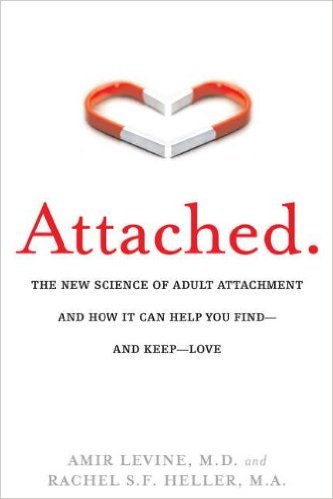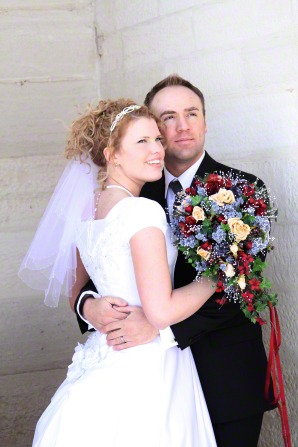There were some minor things that bothered me. The authors put a lot of effort into the premise that Anxious/Avoidant relationships are difficult and should probably be avoided. I agreed with that premise. However, they make a big deal out of finding ways that married Anxious/Avoidant couples can “cope” or non-married couple of this attachment style should probably cut things off: but they only put a cursory few paragraphs on how people’s attachment style can change. I think with the amount of “Secure” people in the world versus the amount of Anxious/Avoidant there don’t seem to be many opportunities to marry a “Secure” and thus I think there should have been more encouragement to see a therapist or get help from family. I’m not one to think that things have to be the way they are.
Another thought: a friend who is a therapist agreed with me that just because someone has anxiety or an anxiety disorder doesn’t mean they’ll necessarily be anxious in their relationship style.
Anyway, on to my friend Ethan’s (name has been changed) story.
Allergic to Love
KNOW THYSELF was inscribed somewhere on the walls of the oracle at Delphi. It sounds trite, but I am 37.5 years old and still getting amazing jolts, shocking revelations about the whys behind my tendencies. My emotional makeup has elements I never knew about, although they affect my behavior and emotions anyway.
One recent revelation came from a book called Attached: The New Science of Adult Attachment.
Pop-psychology and self-help literature can exist in worlds of their own, where laws are slightly different from those found in reality. They often tell us more about those who wrote them than about humanity in general.
However, when something works, it works. Who knows why magnets work? Regardless of how you explain it, they work.
When I find something that describes succinctly the how and why of my self-defeating behaviors, I treasure such epiphanies. This new book seems to describe why I am still single, afraid of love, and why I short-circuit my relationships and flee.
Attachment Styles
I feel like I have had a love-allergy ever since my divorce. (Love-phobia, even.) I was on Tinder, talking to a single mother my own age. She related that she was recently divorced. I related that I had just barely begun to open up emotionally again, to recuperate after my own divorce—over 13 years ago. She thought that was very funny, that it took me so long to thaw my feet. I giggle less and fret more about this emotional sluggishness.
I dated a girl who had just ended an engagement two months before we met, and she was ready to get back on the trail, hunting for Mr. Right. I was astonished at her quick turn-around time. Did she not care that much about the guy? Apathy and shallow feelings or lack of libido were not the reasons for her ability to let go and start over. The book described the reason for her emotional resilience, as well as my immensely cold feet and reluctant hesitation.
Attached describes three attachment styles: Secure, Anxious, and Avoidant. There is a test inside the book for self-evaluation. The girl who bounced back two months after her breakup? She was a Secure.
These people are the superheroes of romance, emotionally speaking. They give and receive affection readily; don’t play games; don’t expect that a fight or disagreement is the end of the relationship; and have no problem coaching their partners in how to be good at love, explaining how to meet their needs.
Anxious types worry when they are in a relationship. They are clingy, needy, nervous, hyper-sensitive to their partners’ moods, afraid that some text message or look (or the lack thereof) signals some displeasure portending the end of love. These poor souls are prone to jealousy, and easily hurt. They swing from ecstasy to despair in a heartbeat. Hovering over the phone waiting for a return call or text, assuming the worst all the time—this kind of desperate behavior typifies those with the Anxious attachment type.
Avoidants are allergic to love, in a sense. When they become attracted to someone, another system designed to inoculate them against affection throws them into a panic. They start to feel trapped, an irrational emotional claustrophobia, so to speak. They have one foot in the stirrup, and one foot on the ground. (How confident would you feel sitting on a plane next to someone wearing a parachute with his hand on the emergency exit? This is a good metaphor for the internal emotional posture of Avoidants.) These people can come off as heartless, behaving towards partners like cats toying with mice, instead of being loving and empathetic. They might be cruel, or flirt with someone other than their significant others, to deactivate love when attraction becomes too strong. Whenever attraction becomes too strong in themselves or especially others, they tend to bolt like frightened deer.
It is possible to possess elements of all three attachment types, though the authors assume that all people tend to favor one in particular.
What was my attachment type according to the test in the book? I scored high in both Avoidant and Anxious behaviors, and had almost nil in the Secure category.
According to the book, being Anxious or Avoidant does not mean the need for love and companionship and sex is diminished. It just means that these people are prone to self-defeating behaviors, bad love hygiene. They suggest being aware of these tendencies and behaviors, and why they surface, as well as suggesting courses of action to deal with them so that they do not torpedo romantic relationships.
Imagine a blood type that can’t donate to anyone, and can only receive blood from one type of donor. That’s a fair description of how the test in the book casts me.
The book suggests that Secures are like universal donors. Their calmness and openness rub off on both Anxious and Avoidant partners, and help them to begin to exhibit Secure behaviors. Like the tuning fork that causes sympathetic vibration in another tuning fork, Secures are medicinal for their insecure partners.
When an Anxious and Avoidant pair off, the Anxious will chase the Avoidant around trying to sooth her anxiety, and the Avoidant will become cold and insensitive and scarce in order to sooth his feeling of being smothered by the Anxious partner. A death trap, according to the book.
And a fair description of the shenanigans that went on during my brief marriage.
Excessive Immune Response
All this may sound strange to someone who isn’t Avoidant, but it really is like being allergic to love. That pleasurable sensation of being drawn to someone inevitably comes with an opposite and equal urge toward withdrawal, an instinct to bolt. I’ve heard about allergy sufferers who must carry epinephrine syringes to cope with accidental ingestion of peanuts. I wish there were such an inoculation against the fear of love that besets me.
One book about romantic love (Finding the Love of Your Life) asked the reader to create a personality portrait of the traits one’s ideal partner would possess, just to facilitate recognition of a good potential partner when one comes along. I drew a blank as I struggled to pick from the author’s list of traits—the words wouldn’t come. It was like a form of amnesia or mental paralysis. Something inside me recoiled from the Perfect Woman, even the task of describing her personality in writing.
Armed with the perspective of this book, I now have language to describe my bad behavior. I see why, being both Anxious and Avoidant, I get into relationships, then subconsciously sabotage them and bail whenever she gets too close for comfort.
When I’m in the middle of a relationship, I exhibit Anxious behaviors like hovering over the phone, worrying about little snips or criticisms, and fretting over the future. All this fretting turns to fuming, and I look for an escape hatch, often in the form of fault-finding.
The book describes strategies Avoidants adopt to kill love, to deactivate their attraction and thereby short-circuit relationships. Pining for a past relationship with someone and idealizing it, glossing over flaws and pretending it was so wonderful, is one of these strategies. How can I be with Miss Today when Miss Yesterday was so captivating?
Focusing on and magnifying a partner’s warts and flaws is another way of seeking for excuses to bail from a relationship.
(I often find myself drawn towards women with fatal flaws because such flaws look like a built-in escape hatch, a convenient way out of a relationship. If she’s too perfect, I might not be able to escape the swirling vortex of attraction. I never admitted any of this stuff to myself in words, until I read Attached.)
Are there silver linings for me? Anxious types can become hyper-sensitive to others’ feelings. Having an Anxious attachment style helps me to compensate for some of my male social obliviousness. Body language and hints can fly right by men, but when I am attracted to someone, the slightest twitch of the eyelid becomes a subject of interest, and I attempt to interpret these types of cues.
Being Avoidant could morph into being pickier about partners—not settling, not diving into unwise relationships (like I did when I got married). Caution will guide me to tie the knot firmly, with a rope that won’t fray. (Or at least that’s what I tell myself when I’m trying to be optimistic about my diagnosis of terminal love allergy.)
Independence Paradox
The book says that good relationships empower those in them to face the world. Being dependent on each other makes partners stand taller, and act with more apparent independence, confidence, and energy.
Those who approach the world alone might seem more independent, but they are not as secure because they are not fortified by emotional or physical intimacy. Unmet needs of any kind are a chink in the armor.
Ironically, being Avoidant means mistaking weakness—emotional starvation—for independence. Lone-wolf mystique is a big thing in America. We shun the collectivism of Asian societies, preferring to romanticize the iconic image of a solitary cowboy riding his horse mysteriously over the horizon, grimly rippling his jaw muscles and squinting eyes. We romanticize the alpha male man-on-a-mission.
Reality is a world of interdependence and interconnectedness. It starts with our mothers and branches out to fathers, grandparents, siblings, cousins, school mates, friends, coworkers, political parties, churches, and the whole world. When a mudslide across the world decimates a village, people who never met the villagers mobilize.
I made almost nothing I own, save a very few things. Am I independent because I roam the streets at night on staring at the stars? No, the food I eat, clothes I wear, car I drive, gasoline it burns, bed I sleep in, etc., where all made and shipped and sold to me by others.
Emotional sustenance is a real need, which is why solitary confinement is considered a severe form of punishment.
Why isolate myself?
“Introversion” is a term that gets overused to describe quiet and contemplative behavior. Someone who needs people a lot, yet fears them, is SHY, not introverted. Introverts may or may not be afraid of public speaking, but we need our space. We recharge our batteries during peaceful moments and alone-time; extroverts recharge by getting with groups of people and experience high levels of stimulation.
I am both introverted, and somewhat shy. All this means keeping me happy is easy and cheap (“alone” requires no money or planning; just walk away and there you are). Meeting other emotional needs? Combining Avoidant and Anxious and Introverted and Shy is a recipe for bachelorhood.
I hear Einstein wrote out some kind of contract for his first wife, including a bunch of stuff about how quiet she would be around him, and not bother him. This sounds juvenile, but there really are human beings (in case you were wondering) for whom peace is an end unto itself. Human contact is very stimulating—which is why extroverts crave it, and introverts often recoil.
Helpful Suggestions
A relationship (sigh) is mostly made of interaction with another human being. That means illusory independence has to give way to negotiating, stepping on each other’s toes, blame, constricted privacy, etc. It is like going from a single seat bike to a tandem bicycle. You have to agree and then start pedaling; otherwise you stop and disagree and discuss, or one partner is grumpy about the path the other has chosen for them.
This dreary description of being in a romantic or marriage relationship is, in itself, a pretty good sample of the kind of bitter bilge my brain comes up with in order to protect me from love. It is like a confused immune system, fighting off the good bacteria necessary for life (romantic Crohn’s Disease?).
What does Attached have to offer in the way of hope for the hopeless romantic (disaster area) like me?
In the first place, it gives room for fluidity. These labels are not set in stone, though habits of decades are hard to shake off in any case.
The most helpful part of the book (for me, so far) is a section of suggests from about page 127 to 130.
It is titled, EIGHT THINGS YOU CAN START DOING TODAY TO STOP PUSHING LOVE AWAY
I will sum them up here in my own words, with some commentary:
First, learn to identify deactivating strategies. Am I acting like an Avoidant? Am I fantasizing about love that can never be in order to escape love that is right in front of me? Am I magnifying my date’s flaws, and diminishing her qualities? This reminds me of the STOP survival rule: stranded in the wilderness, you must Stop, Think, Observe, and Plan. Running and screaming will get you dehydrated and killed quickly; it is the calm castaway that survives.
Being aware of the habits that lead to bailing from a relationship is the first step toward stopping them in their tracks. I still need closeness and intimacy, regardless of how expensive my flawed instincts tell me they are.
Second, de-emphasize being a lone wolf, or romanticizing that form of isolationism. Focus on mutual support, togetherness. “Let’s get together, yeah yeah yeah…”
Third, find a secure partner. Your strength gives me strength. I heard that ancient Israelite soldiers who were overly afraid were asked to leave the battlefront—cowardice and panicky behavior are as contagious as laughter. A calm soldier calms his fellows down. (I have often thought that, the quieter a woman whispers, the louder it resonates in a man’s brain (which is why nagging backfires, I guess–but hints don’t work; you have to actually whisper).
Fourth, beware of my tendency to misinterpret behaviors. Is a joke mean-spirited, or good fun? I recently ran from a date because her jokes reminded me of my ex’s abusive and belittling humor. Does my significant other really feel kindly towards me, and have my interest at heart? The longer she stays with me, the more likely the answer is “yes.”
Fifth, enumerate reason to be grateful about a relationship. Focusing on flaws magnifies them and obscures the very real good that is there. Acknowledge the good your partner does, and has.
Sixth, forget the phantom ex. I am no longer in that relationship for a reason—several reasons, probably. If she was “all that,” I would still be with her, right? So stop using her as an excuse to bail on the relationship at hand.
Seventh, forget about “the one.” It is easy (too easy) to imagine an ideal partner. That is not real life. I recently explained to a friend an analogy. Imagine a grocery store where, instead of items on the shelves, you find nothing but shopping carts that have already been filled with assorted items by someone else before you got to the store. You can’t take anything out of the carts, or put anything in. You simply have to look around and choose a cart that most closely matches what you wanted to buy.
This is a lot like dating and courtship. Qualities are either in people, or they are not. Some things that we perceive as flaws are in people (though someone else might see that raucous laugh and bubbly personality as qualities instead of warts). We can do nothing to change others; we simply accept them or reject them. To think we can sculpt and manicure and fix a person after we get married is flirting with disaster.
I have learned through rough experiences recently that we cannot love people in slices—we either accept the whole person, or it is not really love.
What about helping others to change? Change is a voluntary act. We cannot choose change for another.
Eighth, adopt the distraction strategy. A date might include an activity where you are facing each other the whole time, which will activate attraction, and hence drive Avoidants to flee: try a date where you focus on something else. Imagine cooking together. You aren’t having a staring contest at a restaurant table; you are bustling around the kitchen.
This is a little like smuggling yourself into a relationship. Low-dose exposure to stimulus, with successive increases in exposure, can habituate the subject to the stimulus. Low doses of attraction mean less nervousness, and fewer attempts to bolt.
This is perhaps the suggestion from the book I think about most. A perfect date might include something that allows me to be something other than twitter-pated.
Lately it seems like I have been dragging a five foot long piece of toilet paper stuck to my heel around for twenty years, and this book barely pointed it out to me.
Is it too late? Am I doomed? I feel that coming to understand myself is a good omen. In order to predict and control something, you must first have at least some understanding of it.







 by Amanda Waterhouse
by Amanda Waterhouse Four years ago, I published this post on single Mormon men. I think this series on singles is a good time to bring it back (with a few edits and updates) for a re-post. This article does not address divorced men in specific, but the same principles apply. Divorced men in the church are often viewed with more suspicion and judgment than never-been-married men. I hope this post will help us to re-evaluate how we view and treat our single men.
Four years ago, I published this post on single Mormon men. I think this series on singles is a good time to bring it back (with a few edits and updates) for a re-post. This article does not address divorced men in specific, but the same principles apply. Divorced men in the church are often viewed with more suspicion and judgment than never-been-married men. I hope this post will help us to re-evaluate how we view and treat our single men.